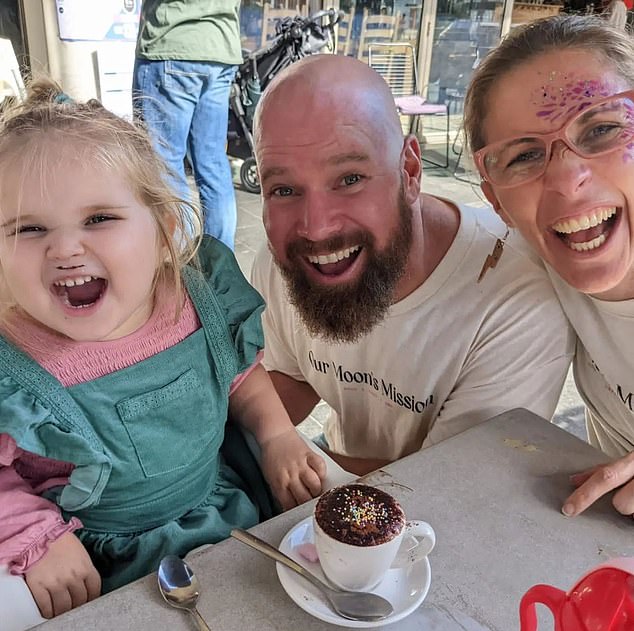Tragic reason couple sells $3 million dream home
A couple is selling their $3 million dream home in an effort to raise money for life-saving treatment for their daughter.
Little Tallulah Moon, five, suffers from a one-in-a-million degenerative brain disease that leaves her unable to walk, talk or sit on her own.
She was diagnosed with Hereditary Spastic Paraplegia Type 56 (SPG56), which causes a person’s abilities to gradually decline over time, and many do not survive past their 30th birthday.
Chris and Golden Whitrod, from Darwin, Australia, recently created a… experimental gene therapy that could alleviate their daughter’s condition – but it will cost $3 million to produce before it can be administered to her in a clinical trial.
The parents must raise the money because their daughter’s disease is so rare that pharmaceutical companies are unwilling to invest in a potential cure.
Tallulah Moon, now five years old, is pictured above. When she was 18 months old, she was diagnosed with the genetic disease SPG56. It has left her unable to walk, talk or even sit up and raise her arms above her head

The family, after failing to meet their fundraising goal, is now selling the family home in Darwin, Australia, to cover medical costs for possible treatment (house pictured above)
Mrs Whitrod said: “This has been a hugely emotional experience.
“But we have to play with the cards we were dealt, so we changed our dreams: from having a dream house to having our family together.”
She added Fox News: “We were hoping that a miracle would happen and we wouldn’t have to sell it, and that help would arrive before we had to get to this crucial point.
“But in the end we realized that this is the last asset we have, and this could help us get to the finish line.”
Ms Whitrod said Tallulah had spent the first year of her life just like any other healthy baby, learning to walk, talk and achieving all the milestones along with others.
But when she turned 14 months, her progress suddenly slowed.
Ms Whitrod told Fox News: ‘We had gone from seeing this beautiful child blossom at fourteen months to regressing to the capabilities of a four-month-old.
“I remember her looking at us as if to say, ‘Why can’t you help me?’ And I felt that as a parent I just didn’t know what to do.”
In August 2020, she was diagnosed with the genetic condition, medically called Hereditary Spastic Paraplegia Type 56.
The condition results from a mutation in the CYP2U1 gene, which causes a mutation in an enzyme that breaks down fatty acids in nerve cells, especially in the brain.
This results in the buildup of fatty acids and disrupts communication between cells, leading to debilitating symptoms.

Tallulah is pictured in the center with her mother Golden, her father Chris and her older brother Finn, who is eight years old. The parents had hoped to use the house to raise their children

Tallulah is pictured above with her parents. Her mother described her daughter looking at her parents as if asking why they couldn’t help her
The condition is normally diagnosed around one or two years of age and gets worse over time.
Mrs Whitrod said that when her daughter was diagnosed, she was told ‘nothing’ could be done and that she should ‘just love her daughter’.
But then she heard the story of Terry Pirovolakis, a Canadian father who liquidated his savings to develop a therapy for his son, who suffers from SGP50 – similar to Tallulah’s condition.
In response, she founded her own research team, which then spent three years developing the experimental gene therapy for her daughter.
The couple bought the property before 2015 and spent years renovating it together, adding new bathrooms and kitchens, even when Mrs Whitrod was ‘heavily pregnant’.
In one of the renovations they even installed a mini spa pool for rest and recovery.
The plan was to use the house, which also has a spa and is in a block overlooking the harbour, as a place to raise their daughter and son Finn, now eight.
But they have now moved and initially converted the house – which has two self-contained apartments downstairs – into an Airbnb rental property, before deciding to put it up for auction.

Above you can see one of the property’s bedrooms
A gene therapy is a medical treatment that aims to correct or replace defective genes, often using viruses injected into patients to deliver the correct gene to the defective cells.
There are few treatments available for the 30 million people in the US with rare, mostly genetic diseases, due to the cost of treatments.
The World Health Organization estimated in 2022 that it cost $4.2 billion to bring a drug to market, making treatments for many of these conditions financially untenable for companies.
Campaigners have called for tax breaks to encourage more research into rare diseases, or for drug tax revenues to go directly into a rare disease research fund.
But in the meantime, this has led many families to make drastic efforts to find treatments for their children.
Ms Whitrod said: ‘We are on the cusp of treatment for Tallulah and for children in her position.
‘We feel like we’re almost there. But three million dollars for a small Australian family is of course quite a lot.’
The house was auctioned this week, the results of which are not yet known.
